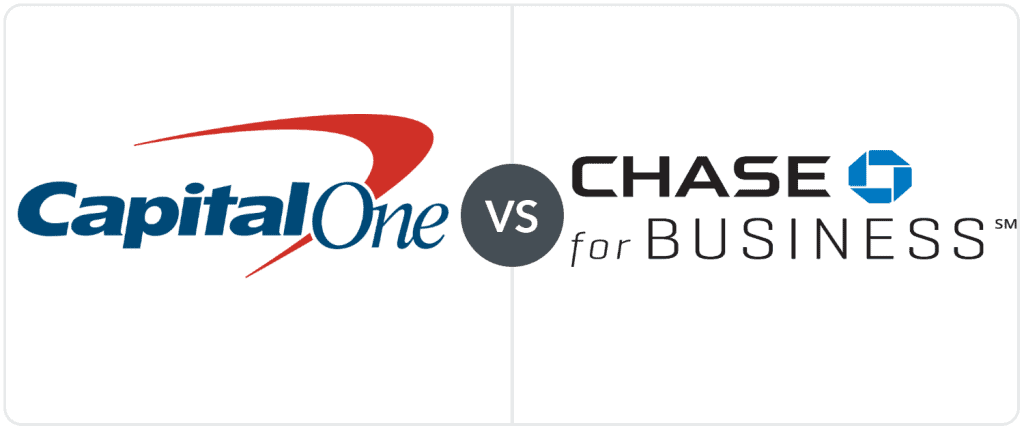
Unlock special perks when you manage your company finances with Rho
Enjoy a seamless business banking platform backed by 24/7 customer support and zero ACH fees. Apply for a Rho account in minutes today.
Learn More💳 Save money on credit card processing with one of our top 5 picks for 2026
Capital One and Chase both offer good business checking and banking options, but when choosing between a Capital One vs Chase business account, it helps to have all the facts.

| Capital One | Chase | |
|---|---|---|
| Ideal For | Businesses with heavy cash sales | Businesses operating in multiple states |
| Services Offered |
|
|
| Banking Pricing | $15-$75/month (waivable) | $0-$95/month |
| Accounting Integrations | Xero | Various; added costs |
| Standout Features |
|
|
| What’s Missing |
|
|
Both Chase and Capital One are established names in the banking world and offer a long list of business services and features to help business owners manage their finances. But how do you decide between Chase vs Capital One? If your search for a small business bank has led you to this comparison, this post can help you decide which is better for your business.
We’ll take a look at both Chase and Capital One’s bank fees, branch availability, interest rates, and more, so you can declare a winner in this Capital One vs Chase head-to-head competition.
Table of Contents
When it comes to business services, Chase and Capital One are neck-and-neck in terms of offerings. Both have business checking, savings, credit cards, payment processing, and even lending, so how do you choose between them?
In terms of business banking, there are some key differences between the two. Capital One is much cheaper than Chase and is the only one of the two to offer a high-yield savings option (though you can get a certificate of deposit with Chase). The next big difference is that Chase offers same-day access to funds and more advanced finance management features.
The winner will ultimately depend on which features, rewards, and fees your business is looking for.
Let’s dive into a more detailed comparison.
Each of these banks has monthly fees attached to business bank accounts, and each bank sets conditions under which those fees can be waived. Chase’s fees are higher than Capital One’s and more difficult to waive, though Chase offers same-day access to cash from POS sales that Capital One doesn’t. It’s a toss-up on whose cash deposit fee is higher, as it depends on how much you plan on depositing each month.
All-in-all, Capital One edges Chase out by offering lower monthly fees with lower minimum balances required to waive said fees.
Capital One offers two types of business checking accounts in addition to business savings. These accounts come with monthly fees of $15 or $35, which can be waived with minimum balances of $2,000 or $25,000, respectively.
In terms of other fees, Capital One has no ACH fees and no mobile deposit fees on either plan. Wire transfer fees and cash deposit fees vary based on whether you go with the Basic Checking or Enhanced Checking account.
Chase offers three business checking accounts, and they come with monthly fees from $15-$95 that can be waived if you keep a minimum daily balance of at least $2,000-$100,000, depending on your account level.
In terms of other fees, Chase offers unlimited debit transactions and Chase ATM transactions. Cash deposit, wire transfer, and ACH fees vary depending on whether you go with the Chase Business Complete Banking, Chase Performance Business Banking, or the Chase Platinum Business Checking account.
Both Capital One and Chase waive savings account fees if you open both checking and savings accounts.
Both Capital One and Chase are reputable banks with solid banking features.
For checking accounts, both offer expense tracking, cash flow management, business checks, fraud protection services, and more. For savings accounts, both offer FDIC insurance and mobile apps.
There are many minute differences between each bank’s features, but the main differences are as follows.
Both Chase and Capital One have much to offer small business customers, and your decision will come down to your personal preferences and feature needs.
Capital One has lower fees and higher interest-earning options than Chase, plus way more ATMs. However, Chase has more physical locations if you want to bank in-person and has more advanced cash management features. Here are some other factors to keep in mind when deciding between the two:
Still not convinced either of these business banking options is right for you? Check out our picks for the best online business bank accounts and avoid having to apply at a local branch altogether. If you’re self-employed, look for a bank account for freelancers and independent contractors to find the best option for your needs
Once you’ve picked the business bank account for you, be sure to check out our guide on how to open a business bank account to get started.
Featured Offer: Earn Unlimited Interest & Cash Back 🏦
Grasshopper Bank  |
|---|
With a high APY, cash back, built-in cash flow, invoicing, and no monthly fees, Grasshopper Bank has an enticing package for small business owners. Learn More.
Featured Offer: Earn Unlimited Interest & Cash Back 🏦
Grasshopper Bank  |
|---|
With a high APY, cash back, built-in cash flow, invoicing, and no monthly fees, Grasshopper Bank has an enticing package for small business owners. Learn More.
Want to help shape the future of the Merchant Maverick website? Join our testing and survey community!
By providing feedback on how we can improve, you can earn gift cards and get early access to new features.
 Our expert reviewers found BusinessLoans.com to have a quick and easy application process alongside excellent support and guidance for borrowers.
Start A Quick Application
Our expert reviewers found BusinessLoans.com to have a quick and easy application process alongside excellent support and guidance for borrowers.
Start A Quick Application
Help us to improve by providing some feedback on your experience today.
The vendors that appear on this list were chosen by subject matter experts on the basis of product quality, wide usage and availability, and positive reputation.
Merchant Maverick’s ratings are editorial in nature, and are not aggregated from user reviews. Each staff reviewer at Merchant Maverick is a subject matter expert with experience researching, testing, and evaluating small business software and services. The rating of this company or service is based on the author’s expert opinion and analysis of the product, and assessed and seconded by another subject matter expert on staff before publication. Merchant Maverick’s ratings are not influenced by affiliate partnerships.
Our unbiased reviews and content are supported in part by affiliate partnerships, and we adhere to strict guidelines to preserve editorial integrity. The editorial content on this page is not provided by any of the companies mentioned and has not been reviewed, approved or otherwise endorsed by any of these entities. Opinions expressed here are author’s alone.
 Our expert reviewers found BusinessLoans.com to have a quick and easy application process alongside excellent support and guidance for borrowers.
Start A Quick Application
Our expert reviewers found BusinessLoans.com to have a quick and easy application process alongside excellent support and guidance for borrowers.
Start A Quick Application